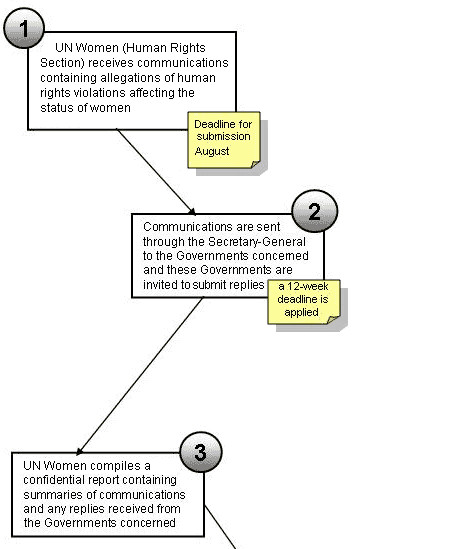
Any individual, non-governmental organization, group or network may submit communications (complaints/appeals/petitions) to the Commission on the Status of Women containing information relating to alleged violations of human rights that affect the status of women in any country in the world. The Commission on the Status of Women considers such communications as part of its annual programme of work in order to identify emerging trends and patterns of injustice and discriminatory practices against women for purposes of policy formulation and development of strategies for the promotion of gender equality.
What types of communications are sought?
Accurate and detailed information relating to the promotion of women's rights in political, economic, civil, social and educational fields in any country anywhere in the world.
What information should be included in a communication?
It is advisable that communications should:
- Identify as far as possible the woman victim, or women victims
- Indicate clearly where (the particular country/several countries) the alleged violation(s) or pattern of violations have occurred or are occurring
- Provide, when available, dates and circumstances of the alleged violations
- Explain the context by providing relevant background information
- Provide, when available, copies of documentation
Examples of categories of communications received and trends and patterns identified in recent years
- Arbitrary arrests of women
- Deaths and torture of women in custody
- Forced disappearances or abductions of women
- Discriminatory application of punishments in law based on sex, including corporal and capital punishment
- Violation of the rights of women human rights defenders to freedom of expression and assembly
- Threats or pressure exerted on women not to complain or to withdraw complaints
- Impunity for violations of the human rights of women
- Stereotypical attitudes towards the role and responsibilities of women
- Domestic violence
- Forced marriage and marital rape
- Virginity testing
- Contemporary forms of slavery, including trafficking in women and girls
- Sexual harassment of women in the workplace
- Unfair employment practices based on sex, including unequal pay
- Lack of due diligence by States to adequately investigate, prosecute and punish perpetrators of violence against women
- Discrimination against women under immigration and nationality laws
- Violations of the rights of women to own and inherit property
- Discrimination against women in accessing international humanitarian aid
- Forcible evictions of women in conflict situations
Any person or organization with a communication should write by 1 August 2012 to:
CSW Communications Procedure
Human Rights Section
UN Women
220 East 42nd Street, 17th floor,
New York, NY 10017
USA
or
Send an e-mail message to: [email protected]
- A Rape Case in Tunisia puts the Legal System on Trial
- Women: Another Casualty of Egypt’s Draft Constitution
- Call for Communication to the UN Commission on the Status of Women
- Resources
- SWMENA data used in research
- IFES Releases Data on the Status of Women in Egypt and Tunisia
- SWMENA Conducts Regional Lessons Learned
- SWMENA Featured in Interaction Monday Developments
- IFES Congratulates the 2011 Nobel Peace Prize Laureates
- Public Opinion Data and Political and Legal Reform Opportunities for Women in Yemen, Morocco and Leb
- New Challenges, Opportunities for Women’s Political Participation in the Middle East
- Women Count
- Infographics Help Advocacy Efforts for Women
- MENA Protests Could Help Advance Women’s Rights
- Popular Protests Pave Way for Women’s Rights in Yemen
- Observing International Women’s Day
- IFES Releases Paper on the Use of Gender Quotas in the Arab World
- Collaborating with Visionaries to Improve the Status of Women in Morocco
- Status of Women in the Middle East and North Africa
- Lobby Training Manuals for Activists
